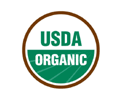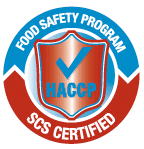Food Labels – What’s in a Name?
Food labels contain a wealth of information to help you make informed choices at the market, but they can also be confusing and even misleading. To become better informed about the labeling and certification in your food choices read the meaning of each label below or visit their website. Better yet, ask the produce manager or the farmer where your food comes from and how it is grown.
 Local – There are no consistent standards for use of the term, which may refer to a region, a state or the immediate ridgeline or watershed. It may also be applied to products that are made locally but of imported ingredients (chocolates, cheese, pastries, locally roasted coffee).
Local – There are no consistent standards for use of the term, which may refer to a region, a state or the immediate ridgeline or watershed. It may also be applied to products that are made locally but of imported ingredients (chocolates, cheese, pastries, locally roasted coffee).
 Organic – Certified by the US Department of Agriculture (www.usda.gov, www.ccof.org) to meet standards that disallow the use of most conventional pesticides, genetic engineering, and routine use of antibiotics and growth hormones in livestock.
Organic – Certified by the US Department of Agriculture (www.usda.gov, www.ccof.org) to meet standards that disallow the use of most conventional pesticides, genetic engineering, and routine use of antibiotics and growth hormones in livestock.
![]() Sustainable – “Sustainable food” certification programs address an array of social and environmental issues that go beyond “organic,” including safe and fair working conditions, healthy and humane care for livestock, reduced pesticide use, reduced water and non-renewable energy use, and enhanced soil health. Visit the Food Alliance (www.foodalliance.org) and Scientific Certification Systems (www.scscertified.com) to learn more.
Sustainable – “Sustainable food” certification programs address an array of social and environmental issues that go beyond “organic,” including safe and fair working conditions, healthy and humane care for livestock, reduced pesticide use, reduced water and non-renewable energy use, and enhanced soil health. Visit the Food Alliance (www.foodalliance.org) and Scientific Certification Systems (www.scscertified.com) to learn more.
![]() Fair Trade – Fair trade partnerships seek to offer better trading conditions to, and secure the rights of, marginalized producers and workers, especially in developing countries. Certification by the Fair Trade Labeling Organizations International (www.fairtrade.net) guarantees that a producer’s fair trade claims have been independently audited and verified.
Fair Trade – Fair trade partnerships seek to offer better trading conditions to, and secure the rights of, marginalized producers and workers, especially in developing countries. Certification by the Fair Trade Labeling Organizations International (www.fairtrade.net) guarantees that a producer’s fair trade claims have been independently audited and verified.
 Fair Labor – Criteria includes hiring and employment practices, safe workplace conditions, workers right to organize, worker housing, child labor, and access to health, education and transportation services. Currently two organizations certify safe and fair ag practices in the United States: www.scscertified.com and www.safeagemployment.org.
Fair Labor – Criteria includes hiring and employment practices, safe workplace conditions, workers right to organize, worker housing, child labor, and access to health, education and transportation services. Currently two organizations certify safe and fair ag practices in the United States: www.scscertified.com and www.safeagemployment.org.
 Clean – Foods certified by organizations like Scientific Certification Systems (www.scscertified) to have met voluntary standards in one or more areas of potential concern, including pesticide residues, food pathogens, industrial contaminations and heavy metals, and food safety procedures and practices throughout the food supply chain.
Clean – Foods certified by organizations like Scientific Certification Systems (www.scscertified) to have met voluntary standards in one or more areas of potential concern, including pesticide residues, food pathogens, industrial contaminations and heavy metals, and food safety procedures and practices throughout the food supply chain.
Recent comments
Aenean nonummy hendrerit mauris. Phasellus porta.